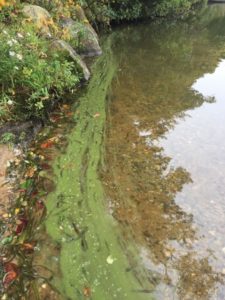PROVINCETOWN — In the face of climate change and humans’ apparent inability to forestall what is becoming an increasingly irreversible disaster, drink water.
Also, you’ll need to use more bug spray. Maybe don’t go into that pond. You know the one: the one that had the algal bloom last year.
Speaking of which, check your septic system. Get it pumped out. Actually, install a new septic system. One of the new high-tech ones. Try not to be old. Old people don’t do well in the heat. Plan your outdoor time for the morning hours. And when the afternoon heat does roll around, you’re going to need to start chugging that water again.
That’s the advice offered by local authorities in a range of fields — scientists, landscapers, and a social worker — on coping with the effects of hotter summers.
According to the National Oceanic and Atmospheric Administration, the average maximum temperature in Boston in May this year was 2.1 degrees Fahrenheit higher than the average for the past 50 years. Mark Adams, an ecologist at the Cape Cod National Seashore and a Provincetown local, explained that, although that doesn’t sound like a lot, those two degrees are significant.
“If there’s even a one-degree change in average temperature, that means there may be days when there’s an extreme change,” Adams said. “Those extreme temperatures can be unsafe for many people.”
“The heat is a concern, because older people’s internal thermometers are not as good,” said Suzanne Grout Thomas, director of the Wellfleet Council on Aging. “And many older people don’t like to drink water because that means they have to make extra trips to the bathroom.” It’s important to do so, though, she added, because “dehydration in times of heat can create real emergencies.”
Thomas said the council on aging’s monthly newsletter, available only online, will, this summer, feature “a whole section about hydrating and not going out in the heat of the day.”
Thomas recalled one “spectacularly hot summer” when the town’s Senior Center was open as a cooling station. “You could come and read a book and be in the cool for a few hours and by evening, when you went home, maybe your house was less oppressive,” she said.
Such solutions may become more common, though Grout Thomas noted that in recent years many people have installed air conditioning — “especially those nifty split units that you just turn on and off with a remote control.” Those units usually run about $1,000, not including installation.
Gunter Leirer, a landscaper in Provincetown, also says heat and hydration are top of mind for him.
“We start early in the morning — as early as we can,” he said. “We quit if it gets too hot. I’m the first one to leave. And I drink lots of water.”
Climate change is changing Leirer’s view of what should be planted on local landscapes. Native plants are a wise choice, he said, because they are already accustomed to sandy soil, which tends to be quite dry and hot.
Wellfleet landscaper Kai Potter (who writes about the local landscape in the Independent) said he has also been planting an increasing number of natives. Among those he recommends are “native grasses like little or big bluestem, viburnums, sweet fern, bayberry, or a nice ornamental like yarrow.”
Potter lives a double life in a way. His two identities — plantsman and surfer — present him with a dilemma when it comes to assessing the impact of rising temperatures and sea levels. As a caretaker of the land, “I have a self who doesn’t want there to be huge storms ravaging various parts of the world,” he said. “But, as a surfer, if we’re getting more weather, I love that.” That’s because “bigger storms equals bigger waves.”

Kevin Johnson is an ecologist and the overseer of the cyanobacteria program at the Association to Preserve Cape Cod. He explains that cyanobacteria are extraordinarily common in fresh water. And at normal concentrations, they present no cause for concern for humans. In fact, in low concentrations, they might even be beneficial: “You have cyanobacteria to thank for our oxygen-rich atmosphere, since they’re the first photosynthesizers,” he said.
The problem is when they start to exist in abundance. Cyanobacteria produce toxins that are “damaging or fatal to humans and wildlife,” said Johnson. “When a pond is loaded with nutrients already, and then you combine that with warm temperatures, toxins start to bloom.”
While cyanobacteria blooms are more common up Cape, Gull Pond in Wellfleet was closed in July 2019 due to a cyanobacteria bloom. It was the first time a Wellfleet pond had closed for such a reason. The bloom was the product of phosphorus deposits (fossil fuel burning is the culprit in that case) in the pond and the increasing temperature of the water.
Replacing cesspools is part of the solution to removing excess nutrients from the water. And even if you have an up-to-date septic system, Johnson recommends having it pumped out regularly.
Gabrielle Sakolsky, a scientist who runs the Cape Cod Mosquito Control Project, explained that there are 25 species of mosquitoes on Cape Cod. Most are freshwater species. There are not many of those around yet, because the weather has been quite dry, she said. But the reason you might be scratching mosquito bites already is because of the heat-induced proliferation of the saltwater species.
“Heat helps move them along the life cycle more quickly,” Sakolsky said. She recommends wearing bug spray and stopping the use of sprinklers on yards, which can lead to water gathering in road drains or gaps in the grass.
Use that water, instead, for drinking.



